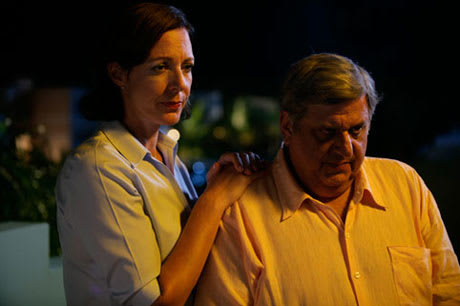The central gimmick of Todd Solondz's latest slice of human criticism, Life During Wartime (a sequel/hybrid of sorts to Happiness and Welcome to the Dollhouse), is similar to that of Palindromes, wherein different actors step in for the same character. It's a tactic used to denote a lack of change despite externality, giving the audience an added layer of comparative analysis and varied pathos, based upon the conflicting expectation of character reaction as confronted by the reality of different actors' interpretation of the scene. Since most of the scenarios are essentially slight variations on themes and moments explored in Happiness, right down to restaurant break-ups and exceedingly unwholesome conversations about paedophilia and sex with small children, Life During Wartime works as an exercise in context. While revisiting the depressive Joy (Shirley Henderson), the domestic Trish (Allison Janney) and the narcissistic Helen (Ally Sheedy) ― all sisters ― we must consider not only things like Henderson seeming schizophrenic in comparison to Jane Adams' deeply pathetic portrayal of the same character in Happiness, but also how similar content fares in a new cultural climate, hence the title. In reiterating the theme of forgiving and forgetting, and its related impossibility, reminders of the war and terrorist acts far away from the gauche strip malls of Florida repeatedly pop up, suggesting that all forms of human interaction are inherently self-serving, thus generating variations on conflict and violence. Solondz even goes so far as to state that paedophilia is a terrorist act, in that it's a single-minded pursuit of id impulse regardless of outcome and effect on others. And while all of this is interesting as a gimmick and many of the exchanges ― "Are you still wet?" "No, I wiped myself with a paper towel" ― are extremely amusing, it's hard to overlook the laboured obviousness of it all, especially since it drones on with the same patronizing depiction of its subjects for the duration. As curious as the experience of watching this social satire may be, there's always the sense that the man behind it might not be capable of the profundity he deeply strives for. And since this is the standard release of the DVD and not the Criterion one, only a few cast interviews are included as supplements.
(eOne)Life During Wartime
Todd Solondz

BY Robert BellPublished Jul 29, 2011



